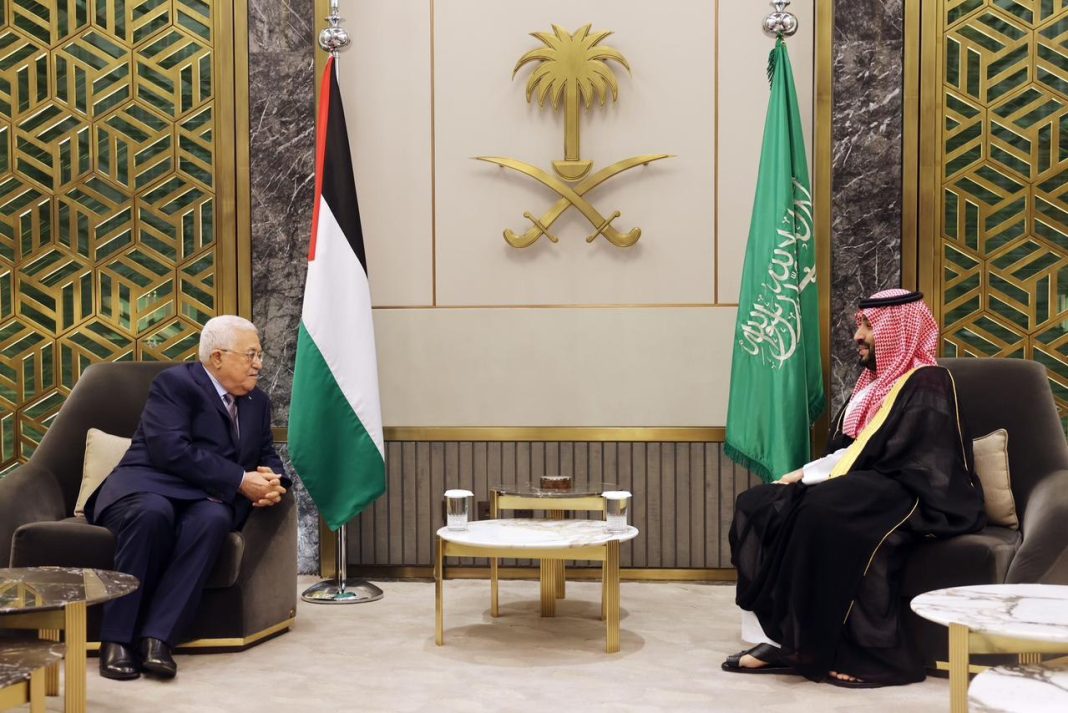Saudi Arabia hopes that an offer of fresh financial support – after aid from Riyadh sank to $0 in 2021 – will help them gain the backing of Palestinian President Mahmoud Abbas for a normalisation agreement with Israel, thereby silencing critics who could claim Riyadh abandoned the Palestinian cause, according to the report.
The Palestinian Authority’s leadership is now debating whether to back Saudi Arabia’s bid and is sending a senior delegation to the kingdom next week for talks on advancing the creation of an independent Palestinian state.
The idea to resume aid was first introduced by Saudi Arabia’s Crown Prince Mohammed bin Salman in an April meeting with the 87-year-old Abbas, according to the WSJ.
The financial support was not directly tied to the PA backing Saudi-Israel normalisation, but in its ability to re-assert control in areas of the occupied West Bank that have come under the sway of independent Palestinian fighters. Saudi Arabia believes that could cool tensions in the occupied West Bank and help the PA regain legitimacy.
Violence in the West Bank is rising amid a spike in deadly Israeli settler attacks and military raids against Palestinians.
According to a tally by Middle East Eye, at least 216 Palestinians have been killed by Israeli fire this year, including 37 children.
A total of 180 people have died in the West Bank and East Jerusalem, making 2023 one of the bloodiest years in the occupied territory. Another 36 people have been killed in the Gaza Strip.
Meanwhile, Palestinians have killed at least 29 Israelis in the same period, including six children.
The PA, established in 1994 following the Oslo Accords, holds devolved authority over parts of the occupied West Bank and was supposed to mark the first tentative step towards Palestinian sovereignty and negotiations over the creation of an independent state.
Its popularity has cratered over its corruption, authoritarianism, security cooperation with Israel, and declining living standards in the region.
Meanwhile, a new generation of Palestinian fighters operating outside of the PA’s control is gaining heft in cities like Jenin, Nablus, and also Hebron. They have received support from groups such as the Popular Front for the Liberation of Palestine (PFLP), and even financing from Hamas and Islamic Jihad, which are opposed to the PA.
According to the WSJ, Riyadh has said that if the PA can rein in resistance fighters, Saudi Arabia would pledge not to accept any normalisation deal with Israel that undermines efforts to create an independent Palestinian state.
Last month, Palestinian Foreign Minister Riyad al-Maliki stated the PA hoped that Saudi Arabia would not yield to US pressure and abandon its condition that official relations with Israel should be linked to an end of the Israeli occupation of the West Bank and the creation of the state of Palestine.
Saudi Arabia has held out the offer to normalise ties with Israel since 2002 under the Arab peace plan which calls for an independent Palestinian state in the West Bank and Gaza Strip, with East Jerusalem as its capital. While Saudi Arabia has not publicly departed from that position, analysts and people familiar with the Joe Biden administration’s thinking tell MEE that they believe Riyadh would settle for much less.
One case they consider that could persuade the crown prince would be a transfer of custodianship of Al-Aqsa Mosque to the Saudi ruling family. Jordan’s ruling Hashemite monarchy is technically custodian of the Muslim and Christian holy sites in occupied East Jerusalem based on WWI era agreements.
In exchange for normalising ties, Riyadh also wants security guarantees from the US, help in developing a civilian nuclear programme, and fewer restrictions on US arms sales – all difficult sells in Congress, where many lawmakers continue to view MbS as a pariah over the kingdom’s poor human rights record.
According to the WSJ, Saudi leaders told the Biden administration that they expect the PA could back their normalisation of ties with Israel even if an independent Palestinian state isn’t created, but that either way, the PA “won’t have any power to veto a Saudi-Israel deal”.
Regional competition within the Persian Gulf also casts a shadow over a potential deal. The UAE, Morocco, and Bahrain normalised ties with Israel in 2020 under the US-backed Abraham Accords. While the Palestinians were not central to the agreement, the UAE publicly justified its decision on the grounds that it halted Israeli annexation of the occupied West Bank.
In the preceding years, however, Israel has drastically increased illegal settlement construction, with new construction plans breaking records this year.
It’s also unclear what difference the PA’s support for a deal would have on public opinion in the Arab world and with armed fighters. The PA is largely seen as illegitimate by Palestinians. The last time it held presidential and parliamentary elections was in 2005 and 2006.
President Abbas scrapped elections scheduled in 2022, citing Israel’s refusal to allow voting in Israeli-annexed East Jerusalem, which Palestinians claim as their capital.
But Palestinian analysts say Abbas baulked out of fear that Hamas, which controls the Gaza Strip, would trounce Fatah, his governing PA party, across the West Bank.
In May, the Hamas-affiliated Islamic Wafa bloc won the Birzeit University’s student union election in Ramallah, in the latest sign of shifting political sentiments in the occupied West Bank.
Political players within the PA are already looking past Abbas’ tenure. One of the key figures being watched is Marwan Barghouti, who ran in the now-scrapped 2021 elections. He is one of the most popular Palestinian figures, but has been serving a life sentence since 2002 in an Israeli prison over his involvement in armed resistance during the Second Intifada.
